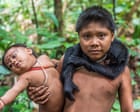
In a world that is constantly evolving and moving towards a more interconnected future, various threads of news stories weave a rich tapestry of human experience and advocacy. Recently, a range of significant issues have been brought to light, highlighting the challenges, triumphs, and efforts of different communities worldwide.
In the vast expanse of the Amazon rainforest, missionary groups have introduced solar-powered audio devices that recite biblical passages, making contact with isolated Indigenous tribes like the Korubo people in the Javari Valley. These devices, which have sparked discussions on legality and ethical boundaries, reflect a broader effort to reach isolated groups despite stringent government regulations designed to protect Indigenous people. The presence of drones in these territories has also been reported, adding a layer of complexity to the situation as state agents work to secure these protected areas.
Meanwhile, in the heart of Central America, individuals previously caught in the churn of political agreements are finding their voices upon release. Venezuelans, who were deported to El Salvador’s notorious mega-prison under a deal between the Trump administration and Venezuelan leadership, are finally returning home. These men recount tales of hardship and alleged state-sanctioned mistreatment during their imprisonment, providing insight into the harsh realities within these institutions. Their stories underscore the importance of human rights and the necessity of reforms in incarceration practices.
Turning to the Pacific, the Victorian Labor Party in Australia is preparing to advocate for a significant geopolitical change. Members are rallying for the federal government to recognize Palestine as an independent state and to introduce sanctions against Israel. This push, reflective of a broader international sentiment, aligns with a call for peace and justice in the Middle East. However, Prime Minister Anthony Albanese has stressed the need for further steps toward a peaceful resolution, even as he condemns civilian deaths in Gaza.
In another stride towards social justice, prominent Australians, including celebrated author Tim Winton, are advocating for fairer university fee structures in their country. An open letter addressed to the government calls for a reversal of the Jobs-ready Graduate (JRG) scheme, which has significantly increased the cost of arts and humanities degrees. This movement, championed by educators and public figures alike, emphasizes the value of the arts in shaping informed and empathetic citizens. They argue that access to education should be equitable and not a financial burden that inhibits passion and creativity.
Finally, in England, alarming findings about the criminalisation of victims of coercive control have emerged from a new report by the Centre for Women’s Justice. Examining the cases of survivors who have been unfairly punished due to their abusive partners’ actions, this research highlights systemic flaws in the justice system. These women, entangled in a web of coercion and manipulation, call attention to the urgent need for judicial reforms that protect rather than penalize victims of abuse. This study offers a lens into the resilience of these survivors while advocating for a more compassionate legal framework.
These stories collectively remind us of the complexity and diversity of the human journey. Each narrative, whether from the depths of the Amazon, the streets of El Tocuyo, or the halls of educational institutions, speaks to the universal themes of struggle, advocacy, and hope. As we absorb these insights, they encourage us to engage with empathy and understanding, envisioning a future where justice, equality, and respect are universally upheld.
Source: {link}
